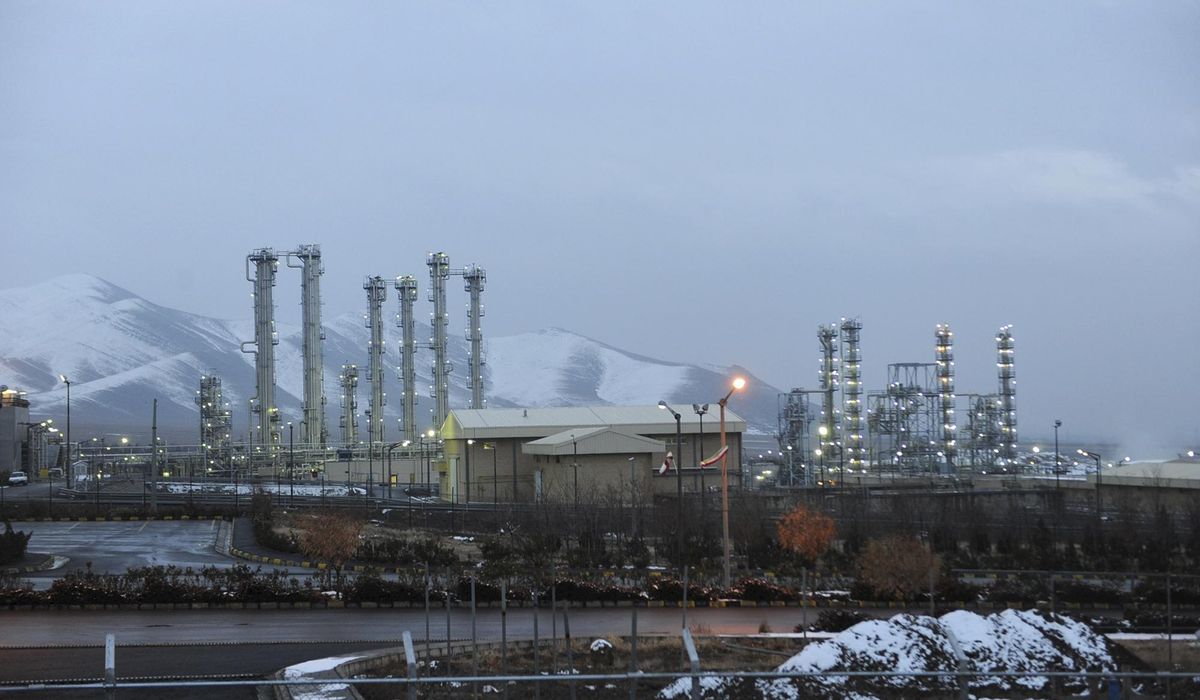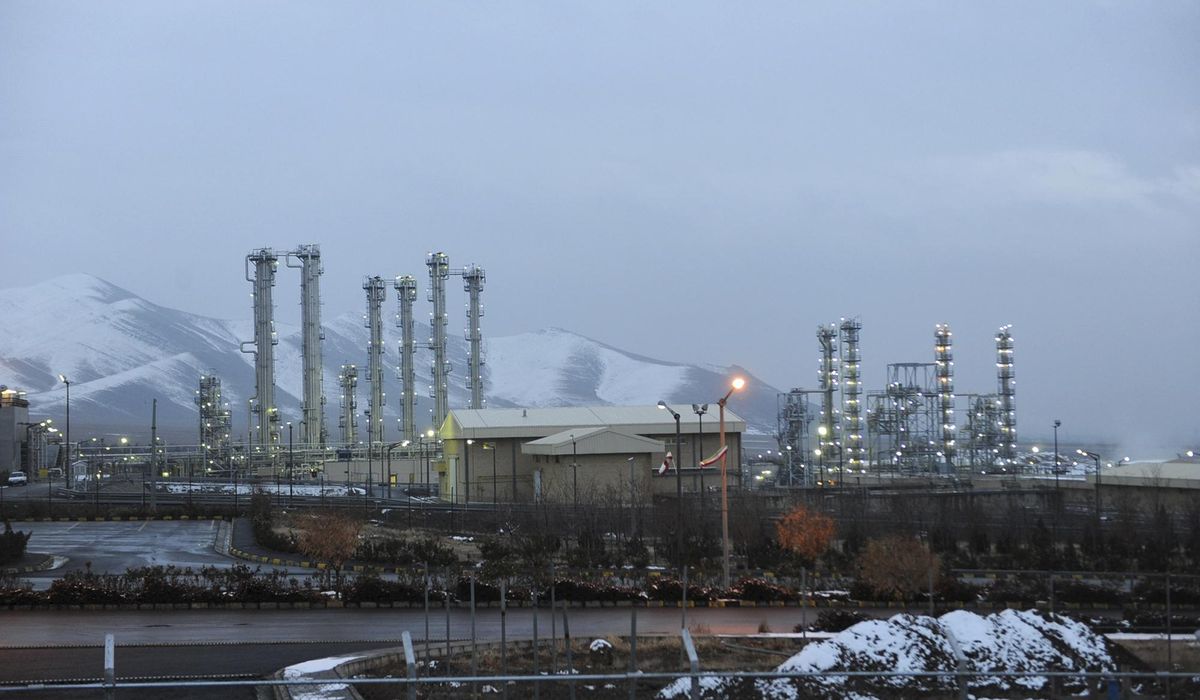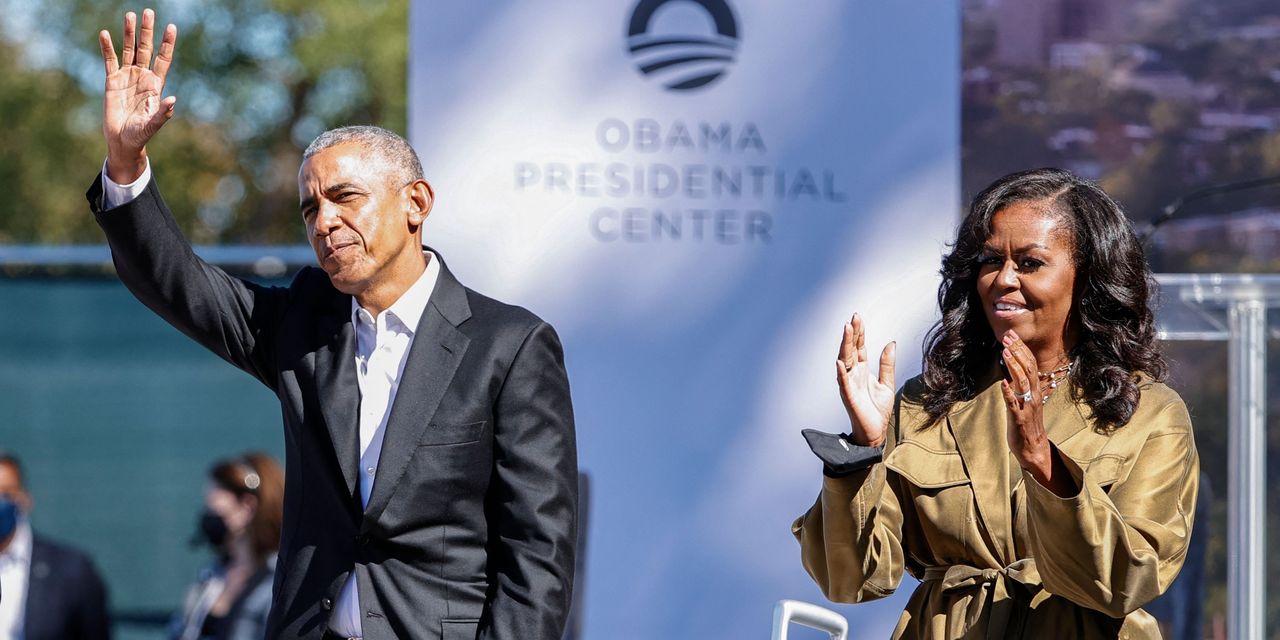
Iran refused to meet face-to-face with American diplomats as talks over the Islamic republic’s suspect nuclear programs resumed Monday in Vienna following a five-month hiatus — a period in which a hardline new government has come to power.
While U.S. officials say time is short for Tehran to bring its uranium enrichment activities back into compliance with limits set by the 2015 Iranian nuclear deal, the Biden administration is clinging to hopes that Iran will soften its posture and rejoin the Obama-era agreement.
But critics say that’s a long shot at best, because the Iranians are demanding Washington make a major concession to get talks rolling — specifically by freeing up billions of dollars in frozen Iranian assets as recompense for what Tehran claims was an unfair sabotaging of the nuclear deal by former President Donald Trump in 2018 when he reimposed crushing economic sanctions on Iran and its trading partners.
The Biden administration has resisted the demand amid tepid signs of progress in Vienna, where Iranian officials met with delegations from China, Russia, France, Germany and Britain — the other signatories of the nuclear deal — at the luxurious Palais Coburg hotel where the deal was signed six years ago.
With the Iranians refusing to participate in the presence of any Americans, a U.S. delegation headed by special envoy Robert Malley spent Monday hunkered down at a separate hotel, where diplomats from other countries offered updates on the discussions nearby at the Palais.
Mr. Malley has said the Biden administration is prepared to remove sanctions on Iran, but he also has indicated that his patience for Iranian posturing is wearing out, telling the BBC over the weekend, “If Iran thinks it can use this time to build more leverage and then come back and say they want something better it simply won’t work. We and our partners won’t go for it.”
‘Positive’ start
EU officials, who are eager to keep the deal from imploding, said Monday that the talks — the first since hardline Iranian President Ebrahim Raisi was sworn in this summer — were off to a promising start. “I feel positive that we can be doing important things for the next weeks,” EU diplomat Enrique Mora told reporters.
All participants showed willingness to listen to the positions and “sensibilities” of the new Iranian delegation, Mr. Mora said, adding that Tehran’s team made clear it wanted to engage in “serious work” to bring the nuclear deal back to life.
The European optimism dovetails with the Biden administration’s desire to revive the deal that had given Iran billions of dollars worth of sanctions relief in exchange for limits on the Islamic republic’s nuclear program back in 2015.
Mr. Trump reimposed harsh U.S. sanctions and attempted to uphold a global embargo on Iranian crude oil by pulling the United States out of the nuclear deal. While U.N. inspectors said Iran has largely observed the letter of the 2015 deal, Mr. Trump and other critics said the agreement did nothing to address what they said was Iran’s support for terrorism and militancy and Tehran’s ballistic missile program.
Iran responded to the new sanctions by reengaging in aggressive nuclear activities, enriching small batches of uranium at levels of up to 60% purity — a short step from weapons-grade levels of 90%. Iran now also spins advanced centrifuges that had been barred by the 2015 accord, and its uranium stockpiles now far exceed limits imposed by the deal.
Tehran insists its nuclear program is peaceful and intended for civilian energy uses. However, U.S. intelligence agencies and international inspectors say Iran had an organized nuclear weapons program until 2003. Nonproliferation experts fear the brinkmanship could push Tehran toward even more extreme measures to try to force the West to lift sanctions.
Making matters more difficult, U.N. nuclear inspectors say they are unable to fully monitor Iran’s program after Tehran limited their access. A trip to Iran last week by the head of the International Atomic Energy Agency, Rafael Grossi, failed to make any progress on that issue.
With that as a backdrop, some regional analysts say covert support from China — one of the key signatories of the 2015 nuclear deal — has helped to keep the Iranian economy afloat over the past few years and may even have made President Raisi even less motivated to negotiate with Washington.
At issue specifically are Chinese purchases of Iranian oil, which have steadily increased since President Biden arrived in office in January. Data compiled by United Against Nuclear Iran, a bipartisan advocacy group in New York, shows nearly 1 million barrels per day of Iranian crude were reaching China last spring, even as global oil prices were starting to climb sharply.
The increasing depth of the China-Iran relationship has been largely ignored by the U.S. foreign policy and national security establishment, even as Beijing and Tehran inked a 25-year strategic cooperation agreement in March.
Russia also has a close relationship with Iran. Mikhail Ulyanov, Russia’s top representative to this week’s talks in Vienna, said he held “useful” informal consultations with officials from Tehran and Beijing on Sunday. The meeting, he said, was aimed at “better understanding … the updated negotiating position of Tehran.”
A report Monday by The Associated Press suggested the position is more aggressive than in June, the last time the various parties gathered for talks in Vienna. The report cited maximalist Iranian demands heading into this week’s talks, with Tehran now calling for the U.S. to unfreeze $10 billion in assets as an initial goodwill gesture.
Ali Bagheri, an Iranian nuclear negotiator, told Iranian state television late Sunday that the Iranian regime “has entered the talks with serious willpower and strong preparation.” He also cautioned that “we cannot anticipate a time frame on the length of these talks now.”
Iranian Foreign Ministry spokesman Saeed Khatibzadeh, suggested Monday that the U.S. could “receive a ticket for returning to the room” of the nuclear talks if it agrees to “the real lifting of sanctions.” He also criticized a recent opinion piece written by the foreign ministers of Britain and Israel that pledged to “work night and day to prevent the Iranian regime from ever becoming a nuclear power.”
Iran’s government regularly portrays Israel as an archenemy, and Israeli leaders have spent recent days escalating a lobbying campaign against the prospect of a renewed nuclear deal with Iran.
Israeli Prime Minister Naftali Bennett has taken a more low-key approach than predecessor Benjamin Netanyahu in his attempts to block a new agreement, but he released a new video message Monday warning the Biden administration and other world powers not to give in to “Iran‘s nuclear blackmail” in the push for a deal.
Tehran seeks to “end sanctions in exchange for almost nothing,” Mr. Bennett warned in the video.
Israeli Foreign Minister Yair Lapid delivered virtually the same message while on a trade trip to Britain on Monday, warning that Tehran will seek to escape the sanctions while holding on to its secret nuclear programs.
“This is what they have done in the past. And this is what they will do this time as well,” Mr. Lapid told reporters in London. “The intelligence is clear, it leaves no doubt.”
British Foreign Secretary Liz Truss, echoing rising impatience in Washington about the lack of progress in talks this year with Iran, said the current round of talks in Vienna may be Tehran’s last chance to cut a deal.
“As far as I am concerned, these talks are the last opportunity for the Iranians to come to the table and agree to the [2015 nuclear deal],” Ms. Truss said, according to a Reuters news agency account. “… We will look at all options if that doesn’t happen.”
• This article is based in part on wire service reports.







